Please enjoy this encore post on the emotional heroics of the Star Wars movies, originally published January 2016.
I’ve seen The Force Awakens twice since it came out, and I was trying to figure out what exactly made it so compelling to me. I finally realized that it honors a tradition from the Original Trilogy: in the midst of an often cartoonish space opera, it’s the moments of heroic vulnerability—not moments of action—that define the series. The more I thought about it, the more I came to believe that this is the emotional undercurrent that kept the trilogy so vital, and the fact that The Force Awakens embraces this theme is part of the newest film’s success.
Spoilers for The Force Awakens to follow.
The Force Awakens has been out for a few weeks now, so we can talk about Han’s death. It’s terrible and heart-wrenching, but on the second viewing, I realized that from the moment Leia asks him to “bring back our son,” Han knows his death warrant has been signed. Each thing that might save him falls away. Finn doesn’t have a real plan, so Han and Chewie have to plant the detonators; Kylo Ren comes into the room; Han watches Kylo, working up his courage, and finally goes to him, knowing what will happen. This moment, when Han chooses to make himself vulnerable to his son, continues a tradition of unique heroism that began in the Original Trilogy.
In A New Hope, the moment of vulnerability is obvious, and it sets the tone for the rest of the series. Luke, against all the advice of the Rebellion, and presumably the screaming of his conscious mind, turns his targeting equipment off and opens himself up to the Force. This builds on Obi-Wan’s earlier assertion that he’d made his first step into a larger world when he first tried to practice blind. It seems odd to think about it, but these are the only two times we see Luke tapping into the Force in the first film—his few minutes of practice on the Falcon, and then the shot he takes at the Death Star. Everything in between those points are standard issue action movie behavior: rescue the princess, escape the stormtroopers, watch your mentor die, shoot enemies you can see with guns that work logically… But suddenly Luke throws all of that out the window to listen to a ghost and open himself up not just to the Force, but to failure.
If the Force doesn’t guide him, and he misses, the whole mission has failed and the Rebellion is probably defeated. If turning his equipment up makes him more vulnerable to attack from Vader, and he’s killed, well, there goes the adventure he’s just set out on, and the larger world he’s only begun to see. Either way this is the defining moment of his existence, and sends him down a path of his own choosing.
Earlier, Luke refused Obi-Wan’s Call to Adventure, and only decided to join him on the trip to Alderaan after Owen and Beru are murdered. He’s takes the chance to learn about the Force from Obi-Wan, but what were his other options? Stay, and keep on moisture-farming? Join the Empire he now hates, just to get away from Tatooine? His only skill is flying, and he imprints on Obi-Wan like a well-feathered duckling because this is literally the first time he’s been able to talk about his father without being shushed. He’s reactionary for most of the film, forced into corners and making the best of bad situations. True, he does choose to rescue Leia, but even then he comes to that decision only after he and his companions are forcibly taken on board the Star Destroyer. Finally, at the end of the film, in the privacy of his X-Wing, he is faced with a definitive choice—trust in the Force, and Ben’s teaching, or use the tech he’s been trained with, and the skill we already know he has. He’s a good pilot, he’s a good shot—he probably stands a good chance of destroying the Death Star on his own. But he chooses to drop his defenses and let the Force in. This is the first decision he makes as a Jedi.
In Empire Strikes Back, Leia gets her own big moment of vulnerability, putting aside her usual matter-of-fact demeanor and throwing herself into a moment. She tells Han she loves him, even though she doesn’t have to. He’s about to be frozen, and she has no idea how much longer she has to live. Vader’s promises can’t be trusted so she must know that if she’s loaded onto his ship she most likely isn’t coming off of it again. She could keep up a brave face, as Han does—she could try to be cool. Instead, she chooses to tell Han the truth to give him something to hold on to, and in return he says “I know”—both to stay strong himself, and possibly, to give her an out. If she lives and he doesn’t, she might be able to move on from the scruffy-looking nerf-herder who couldn’t ever drop the facade.
Han for the record, is never vulnerable in the Original Trilogy. Even when he’s blinded from carbonite sickness, he’s still cracking jokes, teasing Luke, and trying to talk his way out of death. There is never a moment of real fear or pain, and he just rolls with everything, even the fact that Lando—who was in the process of betraying him that last time he was conscious—is inexplicably helping with the rescue. (He’s so cool with it that he in turn helps rescue Lando from the Sarlaac.)
But Leia? Leia opens herself up to her feelings for Han, and, as we now know from The Force Awakens, this relationship defines a large part of her later life. In the new, FA-based canon, her time with Han may have had good moments, but their son’s fall to the Dark Side has largely overshadowed those good memories. She is now the mother of a wannabe-Vader, and the former partner of a smuggler whose cons aren’t working anymore. Her declaration of love has shaped who she is 30 years down the line.
Return of the Jedi makes a very interesting choice, one that, for me at least, defines the Original Trilogy: Instead of culminating with a straightforward battle between “good” (Luke) and “evil” (Vader), the film doubles down on Luke’s earlier moment of placing his trust in the Force. By going to Vader and refusing to fight, he offers himself up as a sacrifice to his father’s better nature. And, to the film’s credit, Luke’s struggle with the Force is taken completely seriously. He lashes out at the Emperor when it becomes clear that his friends are being massacred. He attacks Vader when he realizes that he’s given Leia away. Twice he falters, and almost gives in to violence. But each time he pulls himself back, which makes the final scene all the more powerful. This stands in stark contrast to the climax of The Empire Strikes Back. When Vader cuts his hand off and asks him to join the Dark Side, Luke chooses to drop to what seems to be certain death. But there is plenty of ambiguity in this moment. Is Luke rejecting the Dark Side? Is he rejecting his father’s true identity? Is he allowing the Force to guide him, or is he acting on his emotions? The moment (which is my favorite in the entire series) is open to interpretation. Luke’s choice to spare Vader in RotJ is not.
After striking out at the Emperor, and seeing that his father is still defending him, he gives up again, even though he knows it’s hopeless now. After fighting Vader to a standstill, defeating his father in a battle, he stops short. Luke has the upper hand; he could kill Vader in a moment, and maybe even have enough strength to at least wound the Emperor. Or he could turn to the Dark Side, as Mark Hamill himself thought he should (and as I thought he would, the first time I watched the film). But he rejects both of those choices, too. He stops fighting, refuses to kill his father, and, in the ultimate moment of neck-baring, throws his lightsaber away. This isn’t choosing death, this is choosing torture, this is choosing to watch all of his friends die, this is choosing an utter nightmare, all so that he can prove to his father, and to himself, that the Light Side of the Force is as strong as the Dark. This changes the course of Anakin’s life, and ultimately the galaxy’s, as Vader turns on Palpatine. Which leads us to considering Anakin. Does he ever have such a moment?
If I wanted to, I could cite endless reasons why the prequels don’t really work as films. (As visual art? As worldbuilding? Heck yeah. Just not as film.) But the real thing is simply that due to a combination of on-the-nose dialogue and stiff acting, there are no moments of true vulnerability. Obi Wan is the Han for these movies, throwing out quips left and right. Anakin is the romantic hero, and Padme is the sensible senator who wants to do right by her people. None of them have the moment of true vulnerability that would have given the films a heart. Padme should, since she becomes pregnant and then has to face Anakin’s turn to the Dark Side, but since they never have a believable connection begin with, there’s little emotion when she leaves him. Anakin has a few opportunities: leaving his mother, returning to find her murdered, learning Palpatine’s true identity, and finally, the most obvious one, the climatic fight with Obi Wan. None of these moments land because everyone involved states the obvious at all times. There is no subtext, there are no “I love you” / “I know”-style twists. People say what they mean. Anakin screams “I hate you!” at Obi Wan, but imagine the movie where he says he loves Obi Wan in that moment instead. The movie where Padme turns cold, and buries her love, and leaves Anakin without tears, but opens up to Obi Wan later. The movie where Padme lives, but has to give her children up for their own safety, and live knowing that Vader could come for her at any time.
The closest the prequels come to that real moment is Obi Wan screaming that Anakin was the Chosen One—but even then Obi Wan has the high ground, both physically and emotionally. There’s no danger, and the emotional impact is lost in all that lava.
Han finally gets his moment in The Force Awakens. He kept himself cool (uh, no pun intended) during the freezing process; he never lost his witty exterior throughout the dangers of Stormtroopers and human-flesh-craving Ewoks in RotJ; and even when he was faced with Leia loving Luke, he kept it together: he simply offered to stay out of their way so they could be happy together. We thought he’d made it through the series with his cool exterior intact. An entire generation of SW fans grew up and had kids with only this Han in their minds: iconic vest, quips, last minute heroism, the shrug when he cons the Empire into surrendering to him. It’s a testament to his coolness that the Han Shot First/Shot Solo argument even existed. People were so angry about the idea of their hero being outgunned that it became the focal point of the backlash against George Lucas.
The Force Awakens throws that away like an unneeded weapon. Han is older, broken, still trying to con people, still trying to be slick, but he can’t really do it the way he used to. And no, it’s not because he’s older, it’s because he’s suffered now. He and Leia may well have drifted apart anyway—their relationship was always volatile even in the first three films. But losing Ben? Waking up every morning and knowing that your son rejected you, and chose a life of darkness? There’s no quip that can fix that. So here, thirty years later, we finally get Han’s moment: not with Leia but with their son.
But it begins sooner than that, I think. As soon as Leia asks Han to “go get our son” the look in Han’s eyes tells us that he knows he’s a dead man. When I watched the film the first time, I realized then that I was about to watch this character die, and I actually missed most of Rey’s rescue because I was waiting. This was good, the way the movie warned us, almost subliminally, that we were about to see something terrible. It made it easier, to know along with Han. Watching it a second time I was able to pick out the nuances. He tells Chewie to go up to set the charges on the upper levels of the Starkiller Base, which gets him out of the way. He also gives him the detonator, which means their plan still has a chance even if Han’s not there to see it through. He can trust Chewie. The kids are safely outside. Leia’s far away—she’s not there to see him fail, or rise to the challenge of facing Ben. Even knowing all of this, Han considers bolting. When he sees Ben on the catwalk, you can see it in his face. He could run, blow the place, kill his son, and deal with the grief for the rest of his life…but at least he’d have a life. But of course he doesn’t run. He lives in a universe where heroism, true heroism, is defined by vulnerability. By trust. And it’s his turn to be the hero now, not Finn’s or Rey’s.
When he faces Ben, he never reaches for weaponry. For all that we mock Emo Kylo Ren (and believe me, we do) he’s still a Force-user, trained by Luke Skywalker. We’ve seen him probe people’s minds and stop blaster shots in mid-air. Han is totally outmatched here. But the point is he doesn’t even try to defend himself. In fact, he stands so close to his son that he doesn’t leave room to draw a blaster even if he wants to. And I would argue that he isn’t trying to talk his way out of anything, he isn’t trying to be charming. The words he uses on Ben are not a line. He’s just pleading with his son to come back, and when he son opens up to him, he replies that he’ll do “anything” for him. And it’s that, that “everything”, knowing that he’s talking to a murderer but only seeing his child, that is his real moment of heroism. And, as with the others, it defines his life, becomes the moment of his death, and defines where the universe will go from here. In that moment, Han becomes a martyr, Kylo Ren earns the hatred of Chewbacca, Finn, and Rey, and the Star Wars Universe gains its most hated villain.
After we all saw the film the first time, my friends and I debated whether Kylo Ren could be redeemed. How can anyone come back from that? How could anyone be forgiven for murdering someone we’ve all loved for decades? This conversation eventually spun into this post: is there an act of vulnerability meaningful enough to redeem Kylo Ren? Will it fall to him to create the emotional fulcrum of the next film?
Leah Schnelbach experienced her own moment of vulnerability when Han Solo stepped out on that catwalk, and she hasn’t recovered yet. Come weep with her on Twitter!










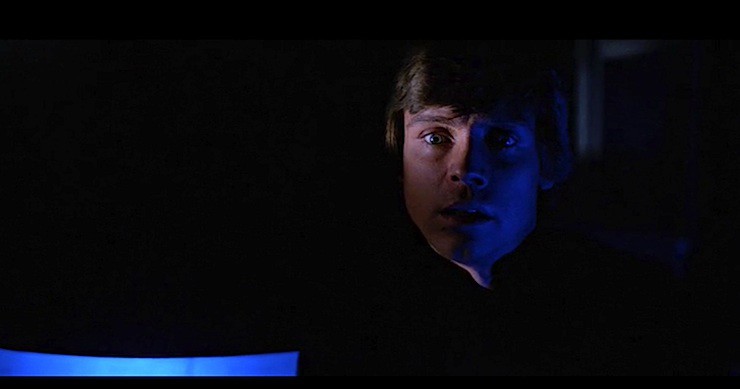
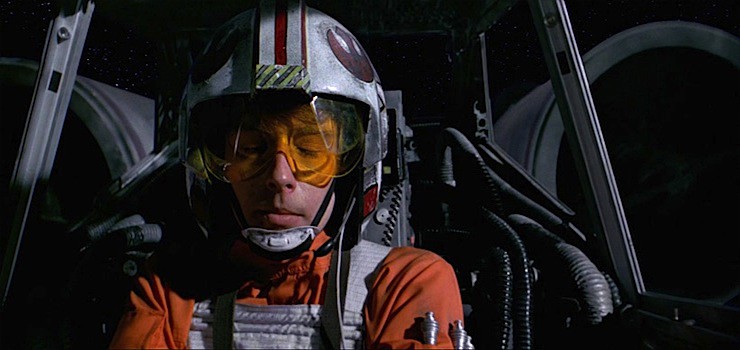
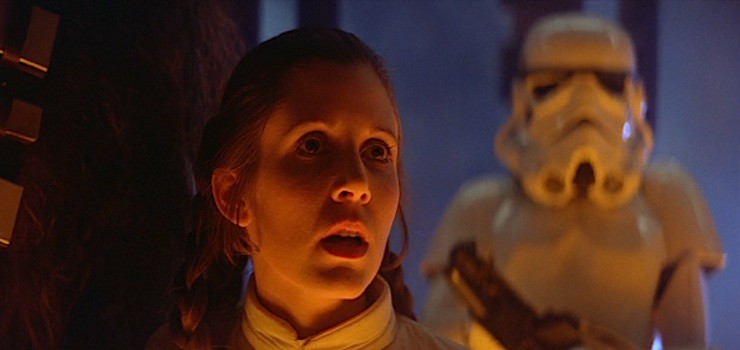
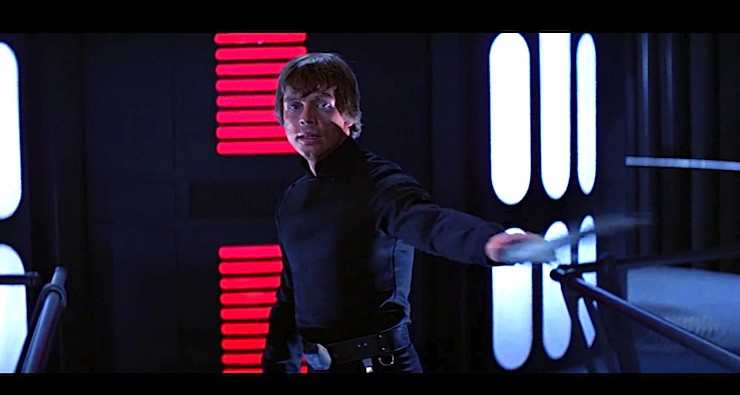
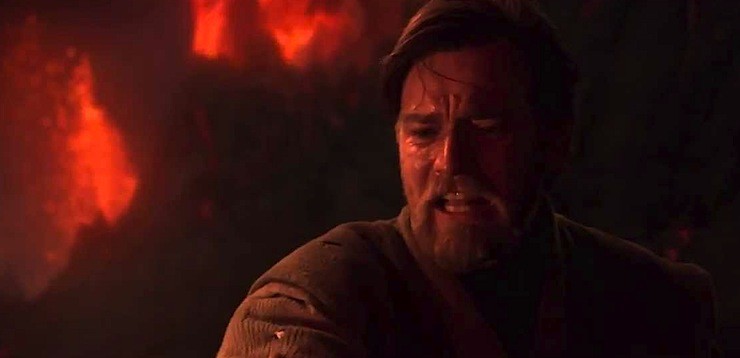
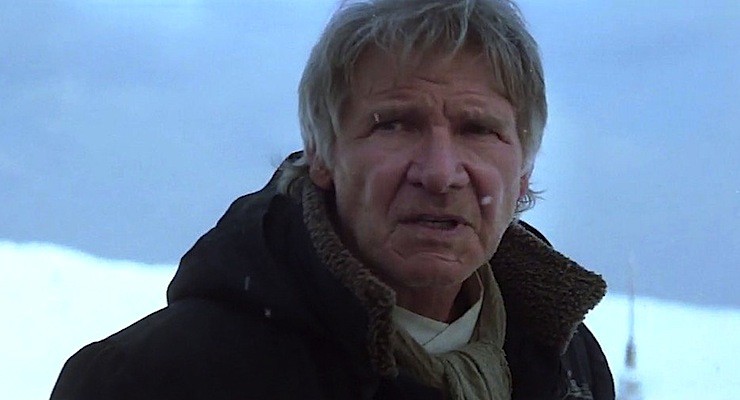
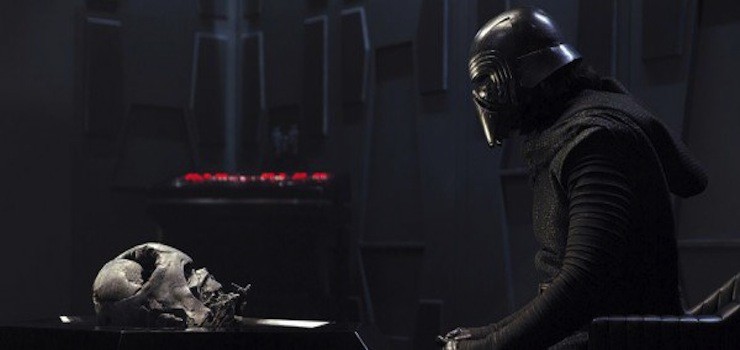
rey and fin dont work as characters. ben does. yes its a matter of will rather than credibility. will ben do this or not do this. i dont really care if he can. but will he. and there is the difference between him and the other two. will rey defeat klyo and find her parents or w/e. i dont care when the plot focused on her specialness, can can can can she do super stuff. can can can can the small fry fin help. i dont care about the answer
Rey and Finn were pretty barebones (and Kylo, for that matter–though he gets the most development). Rey has the shadings of a more complete character though, and with some time in Ep VIII could become well rounded (or nearly so). She has legit underpinnings for a story–why did her folks leave her in the middle of nowhere with a junk dealer? Does she have some heritage that explains her Force sensitivity? How will she deal with being uprooted from her life? During the movie her reactions are consistent: help others, and balancing her excitement to Do Things with her need to get back to Jakku to wait for her folks. She’s good with machines always and is a decent enough pilot.
Finn is all over the place. Supposedly raised from a baby to be a stormtrooper, he somehow has a crisis of conscience after a lifetime of indoctrination. Now he’s scared of the FO to the point where he leaves his friends to run. Now his friendships override his fear. He was a low level guy sanitation guy, now he knows where the various bits of the superweapon are and who has clearance to drop the shield. He’s been weapons trained all his life but doesn’t recognize explosives.
Much like Rey he’s a fish out of water character, truly, but his varying competence and reactions make it hard to give him a consistent character. Hopefully they tone that back and give him more of a voice.
Has this post been in mothballs somewhere? Sounds like this was written a year or so ago, but just appeared online “The Force Awakens has been out for ‘a few weeks’ now?
I appreciate when someone takes the time to provide their thoughts, etc., but some more cogent editing might have been advisable.
As for the substantive stuff – I can’t agree that Kylo Ren is Star Wars’ “most hated” villain. Yes, he killed Han, his dad and our hero, but I never got the sense he was doing it out of hate. He’s more like some moody disturbed emo kid who does bad things to lash out. Ren always seems to be trying too hard to impress. In contrast, the Emperor is a truly evil, conniving, manipulative, shrewd, and horrible, and takes great pleasure in overseeing what he hopes to be the ultimate victory of the dark side while pitting father and son against each other. Ren? He’s just all pissy because he couldn’t get all up in Rey’s mind…. that’s the way it played to me, anyway.
I’m not sure I think there really is anything to the Light Side/Dark Side division of the Force. What we see is a difference in philosophies about the proper use of Force abilities without a way to tell whether the sources of power are distinct from each other.
@3: It’s a re-post of an article from Jan 2016, with a somewhat changed heading. No idea why it isn’t marked as such, though.
Re: Max Gladstone’s post; This is why Rogue One fell kinda flat for me – the emotional vulnerability wasn’t written into the script for Jyn, so the actress had to carry the entire emotional arc. Jyn’s tears during her father’s hologram message might have been her heroic vulnerability moment where she decides to join the rebellion, but they seemed unearned scriptwise (also a directing issue), because we don’t know anything about adult Jyn. If we knew how adult Jyn really felt about her father before she saw the hologram, the scene with Saw would be stronger (does she think he actually supports the empire? Does she assume he’s dead? Is she mad that her mother went back for him and got herself killed?). It’s not clear from her conversation with the rebels.
Luke’s vulnerability means something because we know what he has to lose (the rebellion, his life, etc). Padme putting herself in danger to confront Anakin with “you’re breaking my heart” would have meant something if their relationship had been at all believable. Maybe due to being a one-off film, maybe from too many rewrites, we don’t know what anyone in Rogue One has to lose, the exception being Bodhi.
I agree that Rey and Finn have yet to demonstrate heroic vulnerability. Finn comes close when he chooses to go back for Rey instead of flee the empire at Maz’s castle, and Rey’s battle with Kylo Ren was probably supposed to mirror Luke trusting the force in ANH. I’m very interested to see how it all plays out.
This still breaks my heart, even after a year :)
But after a few rewatches of TFA, I’m hoping that the conversation Leia and Han have about who can save Kylo before he heads off is pointing to some kind of foreshadowing, some kind of indication that this heroic vulnerability will bear fruit in some way.
As for Luke, funny, I was just thinking about what my favorite Star Wars moment is, and I said that one – when he throws down his lightsaber. It’s what Anakin couldn’t do because Anakin would probably HATE the idea of being vulnerable. That’s in some ways his downfall. And come to think of it, it’s probably why my favorite Rogue One character is absolutely Chirrut Imwe and I got all tearyboth times I’ve seen it; if anything even more the second time. Because debates on how strong in the Force he actually is aside, he absolutely has that vulnerability down pat – the complete trust in the Force and willingness to surrender himself to it for others. (Bohdi is my other favorite character, so interesting to see him mentioned above. Although I really had no problem with Jyn either).
But one of my favorite things to think about is how Luke manages this victory while also eschewing some of Yoda’s other teachings – his attachments, emotions, love are what saved the day. How to balance the two? I really wish the newer movies would focus on this idea. As much as I love Emo Kylo Ren…just seems like a wasted opportunity. I wish we got to see more of what Luke was meditating on and learning and passing on to others, instead of having it all wiped away by wanna-be Vader.
@6 – I don’t know about Rey, but I think when Finn confesses to Rey about who he is, and then later just flips out when Kylo kidnaps her to the point that he organizes (or at least makes sure he is a part of) a whole harebrained scheme to infiltrate Starkiller Base counts. Or even when he goes to rescue Poe, who has no reason to trust him.
@8 Poe’s rescue was self-interest. He freaked out in the village massacre and didn’t shoot when ordered. Phasma and Ren noticed and he was ordered to report to her unit…probably for severe punishment. And then here he had this resistance pilot who definitely wants to get away from the FO and won’t turn him over to them…well, planning isn’t his thing, but that seemed to have all the important bits in it. Lucky for Finn this was a competent pilot.
@9 – right, that’s why he’s vulnerable. I know his motives weren’t necessarily to spring Poe out of jail out of the goodness of his heart, but he basically is just trying to get away (which is somewhat heroic in and of itself even if fear is also a part of it) and has nobody else to turn to. It’s not a perfect example, but I think you can squint at it.